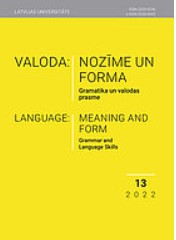Latviešu valodas gramatikas apguve somu auditorijā
Acquisition of Latvian grammar in the Finnish audience
Author(s): Laimute BalodeSubject(s): Foreign languages learning, Language acquisition, Comparative Linguistics, Finno-Ugrian studies, Baltic Languages, Higher Education , Pedagogy
Published by: Latvijas Universitātes Akadēmiskais apgāds
Keywords: Latvian grammar; acquisition of Latvian as a foreign language; language differences; pronunciation errors; literal translation;
Summary/Abstract: The article is dedicated to the twenty-five years of experience gained while teaching Latvian to Finnish students at the University of Helsinki. The introduction to the article gives an insight into the beginnings of the Baltic studies in Finland, the restoration of the lectureship in the 90s of the 20th century, and introduces the current situation. The aims of contemporary students when they choose the Baltic languages as their main study subject are discussed, as well. The article considers the difficulties faced by Finns in learning a new Indo-European language: it briefly explores the difficulties of pronunciation – especially the pronunciation of voiced and voiceless consonants, and the differences in morphological categories (gender and number) in Finnish and Latvian. Word derivation paradigms are the most complex part of speech. Verbs and pronouns are mentioned among the most difficult subjects for students, while the first conjugation verbs (or “short” verbs) and reflexive verbs are the most difficult to learn (not only because of their form, but especially because of their use). All Finnish students (especially those who have not encountered other Indo-European languages) consider prefixation the most challenging of the grammar topics. Latvian language prepositions and their government also cause many mistakes. Naturally, the students translate many sentences literally from their mother tongue. Consequently, for example, there are difficulties with the expression of such concept as future of the verbs or the constructions of Latvian double denial. The article is based on a voluminous material of student errors. It is the analysis of errors that helps the Latvian language lecturer to identify problems and to emphasize and explain the most difficult things in the study process.
Journal: Valoda: nozīme un forma
- Issue Year: 2022
- Issue No: 13
- Page Range: 7-21
- Page Count: 15
- Language: Latvian

